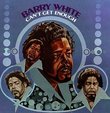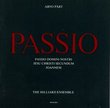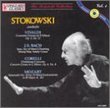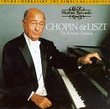| All Artists: Tchaikovsky, Stokowski, American Symphony Title: Tchaikovsky: Symphony No4, Op36; Scriabin: Etude in C#m (The Stokowski Collection, Volume 2) Members Wishing: 1 Total Copies: 0 Label: Vanguard Classics Release Date: 4/20/1993 Genre: Classical Styles: Historical Periods, Modern, 20th, & 21st Century, Symphonies Number of Discs: 1 SwapaCD Credits: 1 UPC: 723918801223 |
Search - Tchaikovsky, Stokowski, American Symphony :: Tchaikovsky: Symphony No4, Op36; Scriabin: Etude in C#m (The Stokowski Collection, Volume 2)
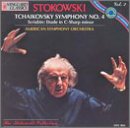 | Tchaikovsky, Stokowski, American Symphony Tchaikovsky: Symphony No4, Op36; Scriabin: Etude in C#m (The Stokowski Collection, Volume 2) Genre: Classical
|
Larger Image |
CD DetailsSimilar CDs
|
CD ReviewsOne of the most controversial recordings in history Larry VanDeSande | Mason, Michigan United States | 08/28/2004 (3 out of 5 stars) "This is the famous Stokowski-American Symphony Orchestra recording of Tchaikovsky's great "fate" symphony that has been derided by critics worldwide since it came out in 1970. The old wizard uses every extramusical affect available -- tenuto, ritardando, score rewriting and embellishment -- to make one of the most memorable (and some say perverse) translations of this great music in history. Right from the beginning, Stoki rewrites the score, bringing the trombones in four measures before Tchaikovksy ordered it. His use of tenuto in the opening movement is maddeningly common, a trait other eccentrics like Harnoncourt use in modern recordings. He continues this trend throughout the first movement. Stokowski's "stop and go" tactics, as American Record Guide called them in their Tchaikovsky overview, are not to everyone's taste. But there is no question about the commitment to the music by both the conductor and the American Symphony Orchestra players, who bring an electric charge to the music uncommon even in this ultraromantic score. Stoki uses all the same approach in the finale, picking up the pace to racehorse speed early, slowing it down, stopping the music before galavanting to conclusion. It is such a bizarre experience that even the Stokowski Web site calls the performance "overinterpreted" and suggests listeners go to the Japan performance available on Arts and Music. I don't know about that. I bought the Vanguard Cardinal record when it was new in 1970, right after reading about it in Martin Bookspan's book where he called it self-indulgent and "near the very top of my own list of recorded horrors." Personally, I have always found this performance refreshing, very much a new and different look at familiar music. To me, this recording speaks in a way most mainstream versions do not. I've owned a lot of recordings of this music including many of the critically acclaimed versions. I found Szell and Janssons play it well but eviscerate Tchaikovsky's gigantic emotions. Most critics like Karajan's way in this music. His famous twofer splits the symphony over two CDs. Ditto the famous mono set on DG (Sanderling). I like Bernstein's first (1958) recording a lot and have returned to it over and over for pleasure and musical understanding. His later DG recording with New York Philharmonic is too slow to generate the kind of emotions necessary in this music. Emotionally, this recording is in a class of its own, one that's not pleased and often confounded critics. The 1998 Penguin Guide to Low-Priced ecordings had lots of bad things to say about it. "Only the Scherzo is comparatively free from interference, whereas the end of the finale is grotesque." Still, they qualified that in the next sentence saying, "The amazing thing is that, through tall these excesses, Stokowski carried the orchestra with him and at the same time maintains the tension at a higher pitch than almost any other recorded performance." So there you have it. I find myself buying this recording every five years or so just to get an idea of where this music can go, then selling it when I tire of Stoki's antics. When it becomes available again I'm sure I will do that same. If you want to hear something in this music you've never heard before, do that same." Should be "Staikovsky" Brian H. Williams | Manteca, CA United States | 11/24/2007 (3 out of 5 stars) "We all know Stokowski arranges music when he feels it will benefit the score. He apprantly felt that Tchaikovsky REALLY needed help on this one. Right from the get go, he changes the opening fanfare from 32nd notes to a pair of 16ths, then has the trombones come in 2 measures sooner, there by doubling the french horns. Now in my opinion, this sounds teriffic! I LOVE it. I like to relish in the full glorious sound! Then he adds a nice a cresendo to the brass, then has a trumpet double the oboe. I could go on and on about the reorchestrations, but I'll tell you this, eccenticity is exciting and it really makes you realize that today's conductors are just down right boring. This performance is emotionally thrilling and just down right exciting. The slowing down and speeding up may make some people upset, but it's all to good effect. The performance really is breathtaking, BUT the interpretation is a whole other matter. If you want to hear the 4th in a more mainstream interpretation, go with Szell, Monteux, Mravinksy or Rodzinski. All of their versions are outstanding. But if you're bored of the same old Tchaikovsky 4, Stokowski is the antidote you need!" The GREATEST classical recording EVER. Kimba W. Lion | the East Coast | 03/18/2010 (5 out of 5 stars) "This recording has been revelatory, not only about Stokowski, his ecstatic approach to music making, and the richness of Tchaikovsky's opus, but also about the natures of music criticism and classical music collectors.
Never in my life have I seen such invective heaped upon a recording as music critics did when this was first released in the 1970s. You would think Stokowski went and personally kicked each one of them in the head. And maybe he did, figuratively. The nature of classical music collecting is basically multiple sameness. Any serious collector has probably a dozen recordings of this symphony, each of which is distinguished from the others by the minutest of details--conductor Horst Baermeister may have the winds a tad louder than Hans Lille, or Karl Jergens may take two seconds longer in the scherzo than Alfred Van Weth; stuff like that. Anyone who takes a truly original approach is reviled by the mainstream community for rocking the boat, for shaking up people's comfortable sensibilities. That strange heritage is preserved here by the two previous review writers, neither of whom could bring themselves to give this recording more than 3 stars, even though they wrote rave reviews about it. Stokowski's approach to music making can only be described as ecstatic, and he was willing to use every means possible to convey such a feeling to his listeners. It is by no means a crime if he changed the orchestration a bit or changed the timing of a few notes--the world still spins on its axis, but I can't imagine anyone not being thrilled by the results. If you love viscerally exciting, true music making, you have to hear this recording. Then, if you are truly honest about your feelings, you will treasure it forever." |

 Track Listings (5) - Disc #1
Track Listings (5) - Disc #1